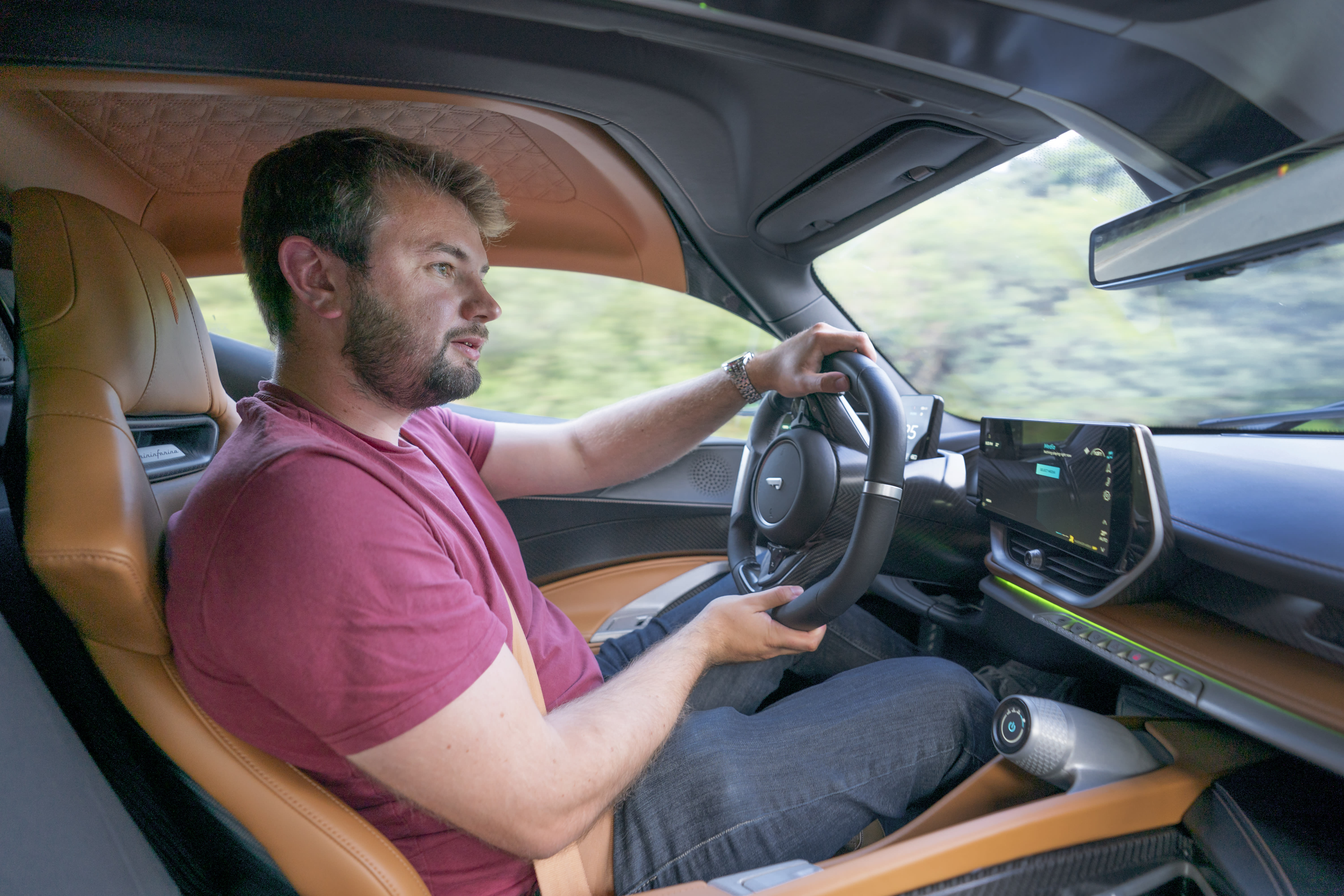
Ford Ranger Raptor (2023-) Review

Introduction
The Ford Ranger is one of those vehicles that has become part of the British landscape, now it’s easily the best-selling truck in the land and a common sight on UK roads. Every farmer, tree surgeon and National Trust volunteer seems to have one.
But these days there’s more to the Ranger than utilitarian cool, and the performance-orientated Raptor model is proof of that. Inspired by the oh-so-American F-150 Raptor, it’s the closest UK customers will ever get to a monster truck, but don’t let that put you off. This vehicle is designed not just to climb every mountain and ford every stream, but to do so at breakneck speed. It’s a marvel of pick-up truck engineering, but is it any good?
Select's rating score* - 4 / 5
At a Glance
The new Ranger Raptor follows the standard Ranger in its basic design, with the new and more aggressive front end, as well as the cleaner yet squarer bodywork. But the Raptor is really defined by its extra off-road equipment, including the raised suspension, chunky tyres and the underbody protection that pokes out from under the massive bumpers. It’s like a monster truck that shrunk in the wash, even though it still towers over pretty much anything else.
The interior is much improved, too, with the massive new touchscreen infotainment system bringing things into the 2020s both in terms of design and technology. There’s a new digital instrument display, which is very good, and there’s a striking dashboard design with red trim and sporty seats, as well as a sports steering wheel. For a pick-up truck, the material quality is excellent.
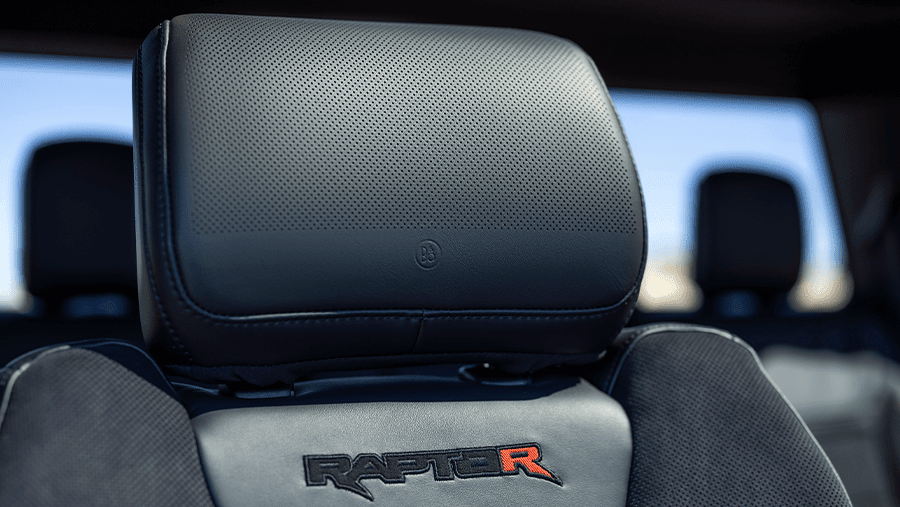
As are the engines. Customers can choose between a 3.0-litre V6 petrol engine with 292hp, or for the more sensible customers, there’s always the 2.0-litre diesel engine with 210hp. The diesel is much the same as that of the old car, but the petrol engine is new and remarkable in lots of ways – not least because of the noise it makes. It’s like bottled thunder.
But the best thing about the Raptor is the way it drives, both on and off the asphalt. On the road, it’s reasonably comfortable and the steering is great, which means it feels like a kind of off-road-orientated SUV, rather than a commercial vehicle. And off the road, it can deal with all sorts of punishment. Where you’d have to crawl over obstacles in a standard Ranger, the Raptor will simply jump over the top like a rally car.
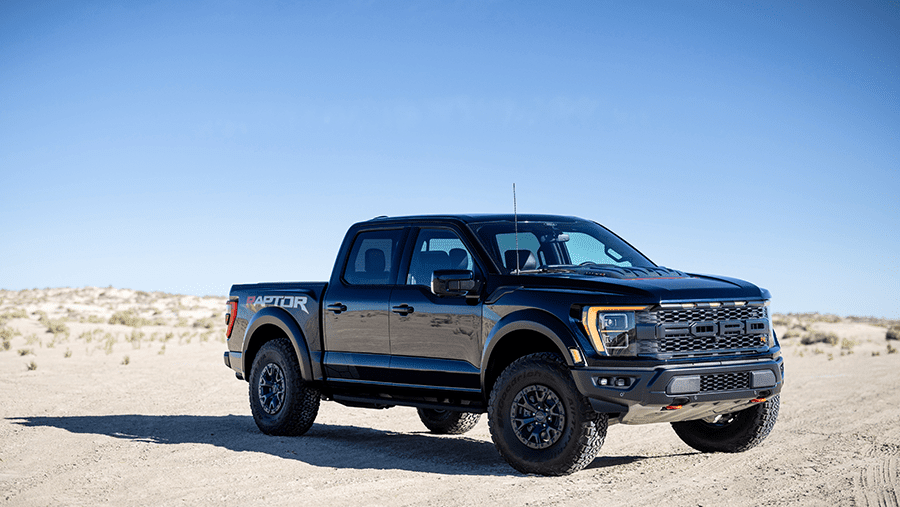
Key Features
The Ranger Raptor is not necessarily a vehicle you lease for logical reasons, but it is a vehicle that steals your heart with its sheer ridiculousness. Nobody needs a massive truck that can jump over sand dunes and plough through rivers, but there’s something cool about the way it can do all that without a moment’s hesitation. Where other 4x4s crawl over obstacles, the Raptor races over them at outrageous pace, and seeing something this big in mid-air is an unforgettable experience. Driving one (or should that be flying one?) in mid air is incredible.
For most customers, though, even that is way more than they’ll ever do with the Raptor. For many, this is all about the image, and the Raptor certainly has plenty of that. From its sheer size – the Raptor dwarves other pick-up trucks, let alone cars – to the massive grille and from the off-road tyres to the plentiful underbody protection, it’s a cool thing and it has a very particular, but very enticing image.
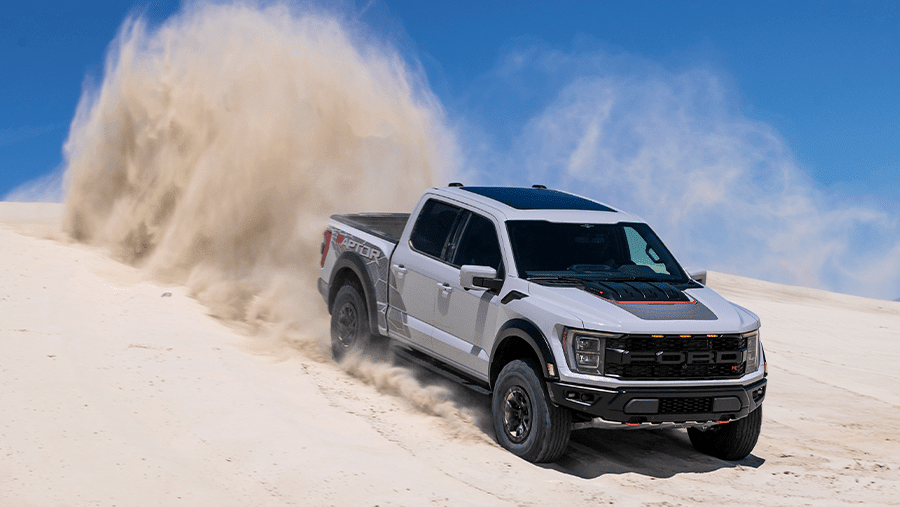
Performance & Drive
Ranger Raptor customers can choose one of two very different engines to power their beast. There’s a 2.0-litre twin-turbo diesel motor, which is essentially the same as that fitted to the old Raptor, or there’s a 3.0-litre V6 petrol engine, which is a new addition. Naturally, the diesel is the choice for anyone worried about running costs (not that many Raptor drivers will do that), but the petrol is the money-no-object choice.
With 292hp and a 10-speed automatic gearbox, as well as a selectable all-wheel-drive system, the V6 makes the Raptor remarkably quick off the line. It’ll race from 0-62mph in just under eight seconds, and flat out it’ll do 111mph. That doesn’t sound all that remarkable in the world of family hatchbacks, but when you’re talking about a massive pick-up truck, that’s outrageously fast.
Obviously, the diesel version isn’t quite as rapid, but even that can still hold its own against other pick-ups. And that’s just on paper.

Where the Raptor really sets itself apart is over rough terrain, where the modified suspension, ultra-strong construction and immense off-road capability allow it to perform the sort of miracles usually reserved for purpose-built racers. A rally car won’t do half the things a Raptor will do, whether it’s ploughing through deep water, launching itself over jumps or scrabbling its way over boulder fields. The Raptor can cope with it all and more, so strong is its underside.
And while most customers will never use the Raptor’s outrageous abilities, they have a knock-on effect on the road. Because the Raptor’s suspension is so good, it handles properly, defying its size and its origins as a commercial vehicle. Admittedly, the latest-generation Ranger is already better to drive than most pick-ups, but the Raptor is on another level. It really does feel like more of a car.
Of course, there are problems. It’s huge, for a kick-off, and the ride isn’t necessarily that brilliant, but it’s more than tolerable, thanks to the squishy tyres and the long-travel suspension. And it doesn’t have the towing capacity or the load-lugging capability of a standard Ranger, which might cause some problems. In terms of sheer fun, though, it’s on another level – particularly with the gargle of that V6 engine providing a fitting soundtrack.
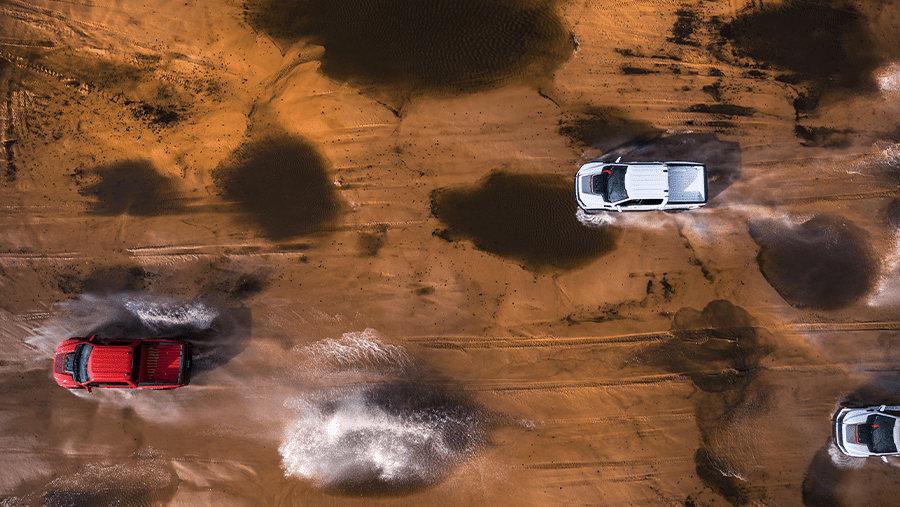
Running Costs & Emissions
How much the Raptor costs to run will, to an extent, depend on which engine you choose. The diesel engine is pretty thirsty, but the petrol engine takes it to a whole new level, with official economy of 20.4mpg. That’s supercar thirst. But the truth is neither version of the Raptor will prove economical or cost-effective. It just isn’t that kind of vehicle.
And that causes problems when it comes to tax. Whereas a standard Ranger is much cheaper to run as a company vehicle thanks to its payload of more than 1,000kg, the Raptor can’t carry as much weight in its load bed. That means it isn’t eligible for the bargain commercial vehicle Benefit-in-Kind tax rates, so it’s just like driving a big, thirsty car: Expensive.
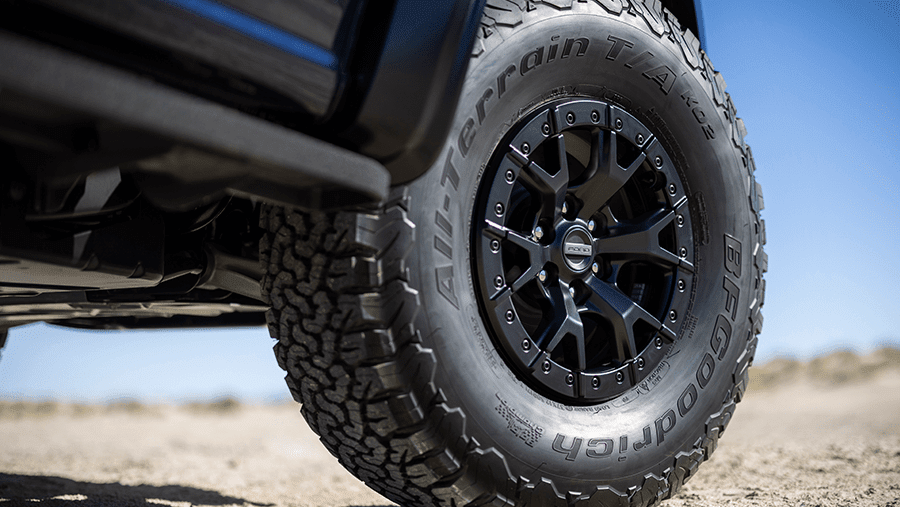
Interior & Technology
Just as Ford has revamped the Ranger’s external design, the company has also given the pick-up truck an all-new interior, the highlight of which is a new central touchscreen. The portrait-orientated display is huge, and inspired partly by the Mustang Mach-E electric SUV. Like that car, it comes with Ford’s latest operating system, which is quite slick and intuitive, as well as being easier on the eye than some other systems. Clear icons make it easier to use, too.
Surrounding that screen is an all-new dashboard with plenty of storage and strong, chunky styling. The red trim around the air vents won’t suit everyone, but overall it’s a reasonably smart cabin that’s far more modern than that of its predecessor. Build quality is good for a pick-up truck, too, with some snazzy materials more suited to a mass-market hatchback than a massive commercial vehicle. However, there are some weak spots, including the rotary dials for the climate control and volume. Ergonomically speaking, they’re very good, but they don’t exactly feel premium.
Nevertheless, the Raptor’s cabin still manages to feel quite special thanks to Ford’s model-specific tweaks. The sports seats are great, as is the sports steering wheel, and the alloy pedals are also smart.
But one of the best additions to come as part of the switch to the new Raptor is the new digital instrument display, which isn’t necessarily the most upmarket screen, but it does at least fit with the modern theme, while still being chunky and in keeping with the image. It’s fairly easy to comprehend, too, and it has various displays so drivers can see exactly what they want.

Practicality & Boot Space
Despite being absolutely enormous, the Ranger Raptor isn’t an especially practical thing. That’s not because it isn’t roomy – there’s plenty of space in the cabin for adults, even if it is a bit dark in there – but because while it can jump over obstacles and tackle all sorts of terrain, it can’t do some of the more mundane stuff a normal Ranger can do.
For example, the Raptor doesn’t have the payload to meet the government’s exacting standards for what constitutes a commercial vehicle. That isn’t just bad news for tax purposes, but it also means the Raptor can’t haul quite as much stuff as your common-or-garden Ranger. Nor can it tow such a heavy trailer, because the Raptor’s 2.5-tonne towing limit is a whole 1,000kg down on the standard Ranger.
And then there’s the issue of boot space. Of course, you can specify a roll cover for your Raptor, and that will provide relatively secure storage, but it isn’t quite like having a family hatchback. Not only is the load bed harder to get at, but it isn’t heated and while it’s fairly waterproof, it’s lined with tough plastic for a reason. And because it’s huge, things roll around in there and make a horrible noise.
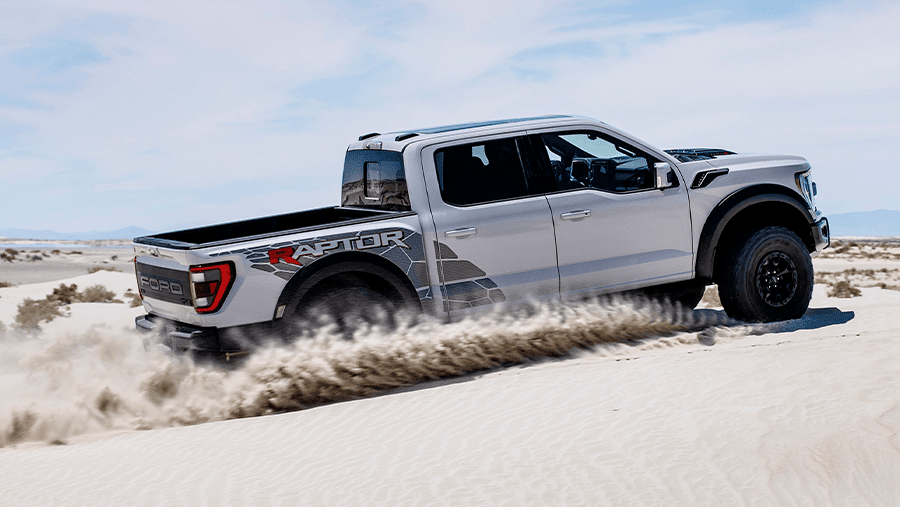
Safety
Euro NCAP’s rigorous crash tests haven’t yet included the Ranger Raptor, but more conventional versions of the new Ranger have been tested. And they scored very well, achieving a top five-star score with solid ratings across the board. Particularly impressive was the 90% score for child occupant protection, which will be music to the ears of potential Raptor drivers with young families.
But the Raptor also comes with lots of standard tech designed to help prevent accidents from happening in the first place. You get a 360-degree manoeuvring camera as standard, as well as brake assistance technology and a collision mitigation system. Automated parking technology is included as standard, too, as well as speed sign recognition and parking sensors at the front and rear.
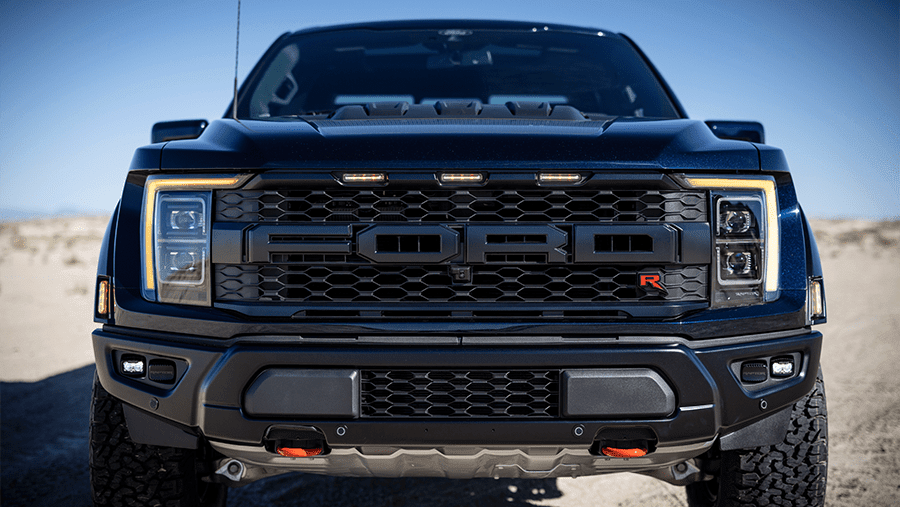
Options
Because the Raptor stands proud of the Ranger… erm, range, going through the specification is a fairly simple task. Standard equipment naturally includes all the fancy off-road and performance-orientated features – the suspension, the tyres and the engine, for example – but you also get a lavishly equipped cabin fitted with the massive central touchscreen, a digital instrument display and climate control. Leather seats are standard, too, along with satellite navigation, heated front seats and a heated steering wheel.
After all that, you probably won’t want much in the way of options, and that’s good news, because the options list is short in the extreme. In fact, aside from paint choices, the only optional extra is the fleet of stickers that can adorn the car if you so wish. Other than that, your only choice is the colour scheme, and there are some spectacular options on that front.
Sedona Orange is almost red, while Code Orange is more of a tangerine colour, and both make the Raptor stand out even more than it already does. But Blue Lightning is perhaps the most obvious choice – a metallic blue that works well with the decals and almost manages to look classy despite the Raptor’s massive bulk.

Rival Cars
Rivals for the Raptor are few and far between. In fact, there’s little else on the market that does quite what the Raptor can do, save perhaps for the bonkers Ariel Nomad. Or maybe the new Porsche 911 Dakar, which is essentially a go-faster Porsche 911 with rally-spec suspension and a pared-back interior.
Aside from that, though, nothing else from a mainstream car brand can do all the jumping over sand dunes and ploughing through streams with four passengers on board. Of course, a normal Ranger will tackle all the same terrain, but it won’t do it at 60 or 70mph, and that’s where the Raptor’s immense strength lies.
So much so that the only other pick-up truck with even a remotely similar attitude is the Toyota Hilux GR Sport. Designed to incorporate some of the sporty styling from Toyota’s racing division into the design of the humble Hilux, the GR Sport manages to be a workhorse with a little more sporting intent. It’s still no Raptor, though.
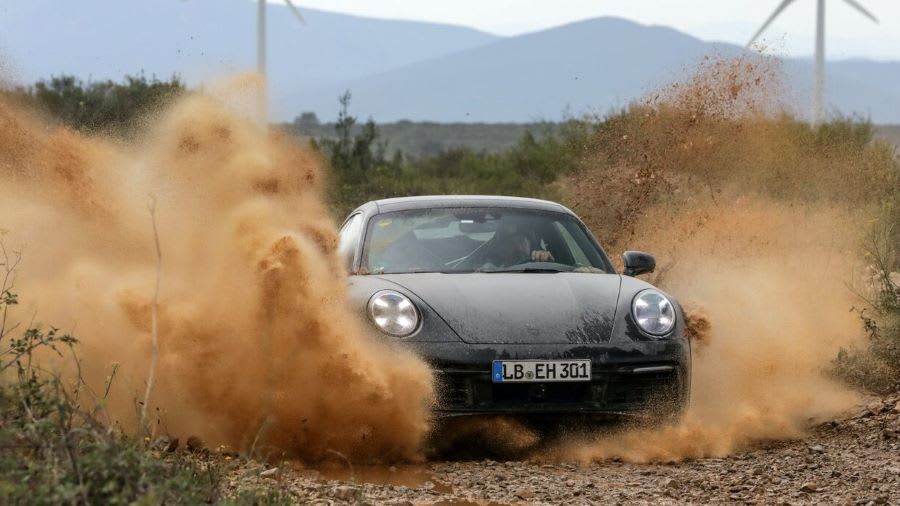
Verdict & Next Steps
The old Ranger Raptor was great, but the new one is little short of brilliant. Of course, there’s absolutely no justification for leasing such a thing – it’s one of the ultimate heart-over-head decisions – but don’t let that stop you. There’s something wondrous about driving a vehicle this large and this powerful, and that produces this much noise. It’s silly, and that’s why we love it.
Yet at the same time, the Raptor isn’t silly at all. This isn’t a pick-up truck that pretends its a monster truck; it really can do all the Baja-esque jumping and drifting and racing. It’s a tough cookie, and that means it’s the real deal. All of which makes it more appealing, even if the toughest terrain it will ever see is a muddy rugby club car park.
Where to next?
View latest Ford Ranger Raptor leasing deals - from just £440 per month inc VAT**.
Call us on 0118 3048 688 or hit the green 'Enquire' button for more details.
Looking for a great deal? Check out our incredible range of van lease deals.
New Pick-Up? Read our latest Car Reviews and find the right model for you.
Want to know more about leasing? Take a look at our comprehensive Leasing Guides.
Interested in everything motoring? Why not catch up on all the latest Car Leasing News.
**Score based on Select’s unique meta score analysis, taking into account the UK’s top five leading independent car website reviews of the Ford Ranger Raptor
**Correct as of 23/05/2023. Based on 9 months initial payment, 5,000 miles over a 24 month lease. Initial payment equivalent to 9 monthly payments or £3,961.44 (Plus admin fee) Ts and Cs apply. Credit is subject to status.
